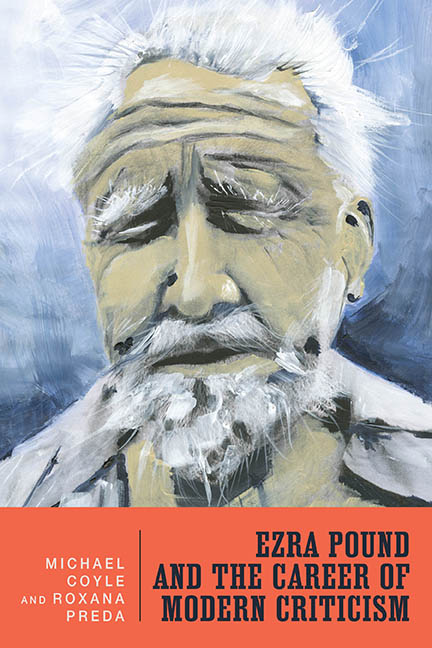Book contents
- Frontmatter
- Dedication
- Contents
- Preface
- Acknowledgments
- 1 From Wabash to Washington, 1907–1947
- 2 A Prize Fight and Institutionalization, 1948–1951
- 3 Kenner, Watts, and Professional Attention, 1951–1961
- 4 Sailing after Knowledge, 1962–1971
- 5 The Pound Era and Its Monumental Companion, 1971–1985
- 6 Pound Studies and the Postmodern Turn, 1980–1990
- 7 Reading Pound in the New Millennium, 1990–2016
- 8 The Many Lives of Ezra Pound: Biographies and Memoirs, 1960–2015
- 9 Educating the World: Periodicals on Ezra Pound, 1954–2017
- Conclusion
- Chronology of the Bollingen Controversy
- Works Cited
- Index
4 - Sailing after Knowledge, 1962–1971
Published online by Cambridge University Press: 17 July 2019
- Frontmatter
- Dedication
- Contents
- Preface
- Acknowledgments
- 1 From Wabash to Washington, 1907–1947
- 2 A Prize Fight and Institutionalization, 1948–1951
- 3 Kenner, Watts, and Professional Attention, 1951–1961
- 4 Sailing after Knowledge, 1962–1971
- 5 The Pound Era and Its Monumental Companion, 1971–1985
- 6 Pound Studies and the Postmodern Turn, 1980–1990
- 7 Reading Pound in the New Millennium, 1990–2016
- 8 The Many Lives of Ezra Pound: Biographies and Memoirs, 1960–2015
- 9 Educating the World: Periodicals on Ezra Pound, 1954–2017
- Conclusion
- Chronology of the Bollingen Controversy
- Works Cited
- Index
Summary
One way by which a poem might be thought to “contain” history is by mirroring in its own large-scale rhythms the rhythms of discovery, wastage, neglect and rediscovery that the historical records give us notice of.
—Donald Davie, Ezra Pound (1965)The View after Mid-Century
WALTER SUTTON's EDITED COLLECTION, Ezra Pound: A Collection of Critical Essays (1963), sought to balance Pound's reception without speaking to partisan issues. Marking an important moment in what was the still comparatively new field—the volume testified to a new self-consciousness of Pound research as a legitimate area in the profession of literary studies. Included in the popular series “Twentieth Century Views,” it did well enough to be reprinted in 1965. Sutton included essays from poets as well as scholars, and from British scholars as well as American. He included, for instance, essays by both Watts and Kenner, an inclusiveness not repeated in any later twentieth-century collection, Watts's opposition to Kenner's more New Critical approach having largely been forgotten along with Watts's briefly important status as “Pound's Expounder.” Sutton included Watts even while pointedly declining to revisit the Pound wars of the late forties and early fifties. As his jacket blurb puts it, this volume “reflect[s] the fresh surge of interest in Ezra Pound since World War II,” but “does not, however, reopen the Pound ‘case.’” If Rosenthal's work holds the impress of previous studies, Sutton's collection overtly displays that body of work as the context for its own activity.
In fact, Rosenthal's chapter on The Cantos is the first in the volume to focus on the poem as the place where the question of Pound's greatness will finally be decided. Generally, Sutton's table of contents could serve as an index to this transitional period in Pound studies—to what the jacket blurb calls “a turning point in twentieth-century poetry and criticism.” The language of the blurb is meant to apply to Pound but, more trenchantly, the phrase “turning point” applies to changes in literary study. The volume opens by reprinting essays from poet-peers Yeats, Williams, and Eliot, but all subsequent essays are written by academic critics.
- Type
- Chapter
- Information
- Ezra Pound and the Career of Modern CriticismProfessional Attention, pp. 76 - 94Publisher: Boydell & BrewerPrint publication year: 2018

